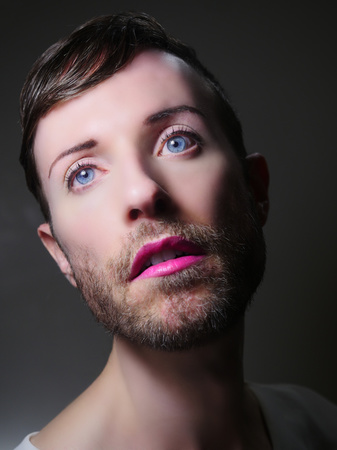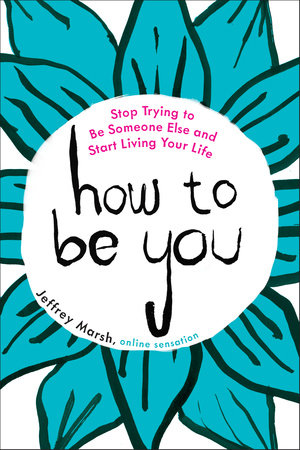
Jeffrey Marsh is a social media star, LGBTQ activist and author of How to Be You
My lips were purple. Big, luscious and purple. I had just learned the age-old trick of ’40’s movie stars: create fullness by drawing outside your natural lip line. Before I was “Internet famous” with hundreds of millions of views, I was a cabaret singer. On a purple-lip night in July a few years back, I sang for a chic downtown crowd then headed home. I was high from the show, strong, confident and cool. You know the feeling: Sassive-Aggressive.
Then the teen boys saw me. Summers on the East Coast can get sticky, and although it was late, there was still a thick heavy moisture hanging all around, especially underground waiting for the train. I got on the Blue Line to go home and had a few stops of smiling, remembering the special night of songs and applause. When the boys got on the subway—laughing and bold—I almost didn’t notice. But it didn’t take long.
“Look down,” I remember thinking. “Don’t start anything.” I froze. There were five of them and one of me. I tried with all my might, standing there in my platform shoes, tight pink jeans and midnight purple lips, to blend into the background. Good. Luck.

Within minutes, the guys began to … engage. They started slow, pointing and making fun. But then things ramped up. They were shouting across the subway car; my heart began to pound. “Fagg*t! Are you a fagg*t?” My palms were sweating. I watched time slow down. I had been studying Buddhism for a few years, and I tried desperately to breathe slow. “Stay cool, Jeffrey. Stay present. And whatever you do, don’t look up.”
But I did look up. And you know what? Nothing happened. Well, not exactly nothing, but nothing bad happened. I looked at them. I stared. Something snapped—something deep within me shifted. I couldn’t articulate it at the time, but I had this overwhelming urge to do nothing. I mean, I was supposed to crumble and cry in a big feminine heaving subway heap or I was supposed to get fiery and shout back. But I only had this impulse to stand there, breathing and seeing.
Hate says everything about the hater and nothing about whoever is hated. It’s not your fault when someone hates you. It’s not “yours” in any way at all. Hate emanates from, is born in and belongs to the hater.
As I write in my book How to Be You, if ever you are hated, or feel you are, I hope you consider the practical advice below. I’ve used it for years.
1. Tell someone.
My goodness, find a friend or authority figure or counselor. Don’t let hatred stick to you in your silence. We are taught to be ashamed that someone called us a name or criticized our way of being, but it all belongs to them. So why not get it off your chest? Find a bon ami who can reflect back your innocence and goodness, or recruit others to help you end the hate. You deserve support.
Watch Jeffrey on TIME’s Facebook discuss how to live your best life.
2. Agree with the hater.
This is the wackiest one, but it’s also my favorite. Agreement short-circuits haters. Someone calls you a nasty name and points out that you’re way too ugly to live. You might look them dead in the eye and say: “Oh my gosh! I hadn’t realized! I AM way too ugly.” (Obviously, “ugly” is an irrelevant concept, and it doesn’t actually matter at all whether someone else thinks you’re ugly. You don’t have to really agree with what the hater is saying.) You’ll find that saying you agree with a hater stops the conversation.
3. Concentrate on ending the hate within.
As strange as it seems, a hater’s hate could inspire compassion in us. In a way, it’s sad that people are taught to spend their valuable precious time on Earth trying to police other people with hate. We can encounter hate outside and turn right around and do something loving and kind for ourselves. We can use hate as a reminder that we deserve kindness.
That night on the subway looking into the eyes of those particular haters, I pondered getting off at the next stop even though I had two more to go. I didn’t. I stood my ground. When I did get off at my stop, the boys didn’t follow. They kept taunting and laughing until the closing door and rumbling train carried them off into audible and memory obscurity. I remember the gust of tunnel wind that follows every subway train; it rustled my hair. And then all was quiet. I did the strangest thing a person could do on a night like that: I smiled.
I was all-of-a-sudden happy that what had just happened had just happened. The teen tormentors had taught me something: hate belongs to the haters. The boys felt that, for instance, someone like me shouldn’t wear lipstick. But one thing was crystal clear for me that night, and maybe for the first time in my life. They were the ones who felt it. They were the ones who thought those hateful things. And I didn’t have to join them.
More Must-Reads From TIME
- The 100 Most Influential People of 2024
- Coco Gauff Is Playing for Herself Now
- Scenes From Pro-Palestinian Encampments Across U.S. Universities
- 6 Compliments That Land Every Time
- If You're Dating Right Now , You're Brave: Column
- The AI That Could Heal a Divided Internet
- Fallout Is a Brilliant Model for the Future of Video Game Adaptations
- Want Weekly Recs on What to Watch, Read, and More? Sign Up for Worth Your Time
Contact us at letters@time.com